In this edition of who wins where and why, we look north to Scandinavia. What started as a fact finding mission on a recent trip to Stockholm quickly revealed that a wider investigation was needed in order to appreciate the Stockholm legal market. The value and significance of the Stockholm Chamber of Commerce (SCC) and the many excellent law firms in Stockholm could only really be understood by widening the lens of our analysis to include all of Scandinavia. This article considers our findings and then focuses on Stockholm as a major international arbitration centre for dispute resolution.
In summary our findings are as follows:
- Arbitration is by far the preferred method of dispute resolution.
- The non-public nature of arbitration retains its position as the most valued attribute of arbitration followed by efficiency of procedure and expertise of arbitrators.
- When litigation is chosen over arbitration the principle reason appears to be costs.
- Adjusting for national bias, the majority of potential claimants prefer the SCC rules followed by the International Chamber of Commerce rules (ICC).
- The main attraction of the SCC rules is the experience, reputation and costs of the institute and arbitrators.
These basic conclusions reveal a simple truth that is good for funders and lawyers alike in Scandinavia and Finland: Arbitration is the preferred dispute resolution mechanism amongst potential users but costs and rising costs are inevitably a concern.
In the previous edition of who wins, where and why?, we focussed on London, England and identified that users are frequently caught in the time, cost, quality triangle in respect of disputes. They want the process to be fast, cheap and of top quality but the principle of the time, cost, quality triangle is that you can only have two at the expense of the third. In Scandinavia arbitration is the preferred dispute resolution mechanism (see Graph 1) because it has a qualitative difference to that of the courts – it is private. It is also considered to be efficient – it is faster and more flexible. These two angles of the triangle have prevailed but it comes at a cost. Third party funding may very well be the key that unlocks the time, cost quality triangle for potential users of arbitration in Scandinavia. A fact that is good for claimants, lawyers, funders, arbitrators and even the judiciary.
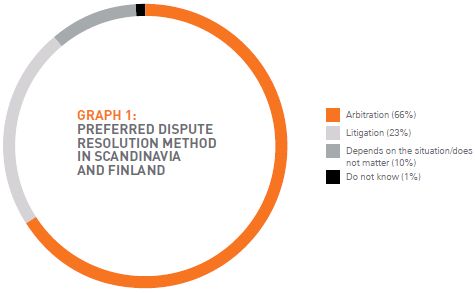
Source: The data for this analysis was the result of a collective study by the law firm Roschier and the independent market research firm TNS Sifo Prospera who conducted in-depth interviews with general counsel and in-house counsel from some of the largest organisations in Denmark, Finland, Norway and Sweden – a total of 264 companies. To this Vannin has added analysis of the statistical reports published by the SCC, our own enquiry amongst the leading firms in Stockholm and from the growing number of disputes that we see from claimants facing or embroiled in SCC arbitration.
ARBITRATION IN SWEDEN
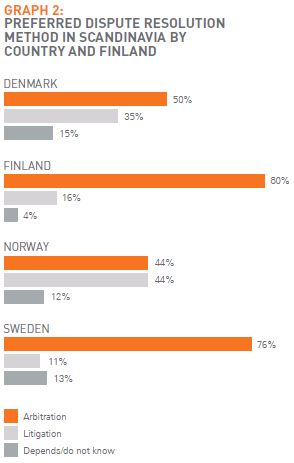
One of the explanations for why arbitration is so popular in Sweden at least is the fact that there is no commercial court. Parties must choose between taking their complex, often sensitive, commercial dispute to the civil courts or to arbitration. That would of and in itself be a good reason to chose arbitration over litigation. However, the differences between these two systems and what they mean for potential claimants goes beyond confidentiality.
Resolution of litigation at first instance may be, relative to other civil law jurisdictions, quick in Sweden, but as with many other litigation jurisdictions (the UK being a notable exception) the losing party has an automatic right to appeal. Consequently, a defendant with deep pockets intent on delaying compensation for its transgressions has plenty of opportunities to overturn the first instance ruling. When we consider the fact that damages tend to be lower and recoverable costs are tightly controlled by the courts, claimants can find themselves in a litigation that is longer than they expected with increased financial risk.
Compare that with arbitration in Sweden where several of the lawyers we spoke to explained that not only do clients get to keep their dispute out of the public domain but owing to the Swedish Arbitration Act courts are reluctant to get involved with the arbitral process. Even if a losing respondent were to attempt a challenge of an arbitral award, they must pay what is owed to the claimant, first as with most arbitration friendly jurisdictions. Combine that with the fact that damages in Swedish arbitration tend to be higher than in the courts as are recoverable costs and it becomes clear that arbitration offers a commercially more attractive solution to potential claimants and funders alike than litigation in this jurisdiction.
There may also be another qualitative difference in addition to confidentiality between arbitration and litigation in Sweden. It is a speculative observation, but worth considering. Sweden is a civil law jurisdiction and accordingly, their judges like in other civil law jurisdictions are highly unlikely to have ever practiced law as counsel. As there is no commercial court with a specialism in commercial disputes arguably this introduces into commercial litigation a difficult variable to assess from a third party funder's perspective. It is a variable that is perhaps best summarised as the difference between empathy and sympathy. If a judge has never experienced running a commercial dispute or defending it for that matter, regardless of how many disputes they may have presided over, they will never be able to put themselves in the shoes of the claimant or the respondent in a way that a good practitioner must do with each of his clients. It is arguable that this lack of empathy and a pleading for a sympathetic reading of the law can only introduce greater uncertainty in respect of a judge's ability to grasp the commercial context for the dispute and accordingly may lead them to reach conclusions that to commercial entities and their funders will appear unjust or arbitrary. Consider the following anonymous statements from the Roschier's and TNS Sifo Prospera' Disputes Index in respect of when parties would use litigation:
- "Disputes with a very low value and only domestic parties. Very simple disputes, not complicated disputes, for example contractual disputes" Finnish participant.
- "Low-value contracts in Scandinavian countries and in certain US states" Danish participant.
- "Disputes with a low value where media attention could not cause any harm" Swedish participant.
It would be tempting to conclude from these sorts of comments that a driving factor for choosing arbitration over litigation in Scandinavia and Finland is a disparity in the size of the damages. And although from a funder's perspective this would be a fundamental consideration in respect of choosing to invest in a dispute, according to the survey on the decisive factors for the choice of arbitration (see Graph 2), dispute value is relatively low in comparison to efficiency of procedure and expertise of arbitrators. The widely held view appears to be that there is a skills gap between litigation and arbitration when it comes to commercial disputes. Businesses appear content to use the courts for low value, less complex matters but when commercial disputes are complex and/or high value, it is to arbitration that they turn and accordingly it is to arbitration in Scandinavia that funders of disputes will also turn.
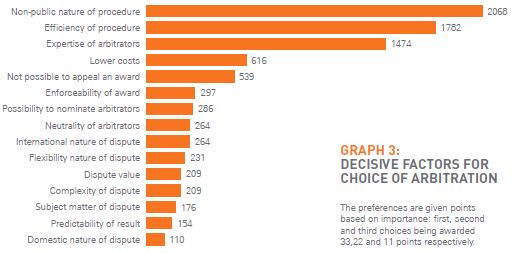
Furthermore, one of the chief engineers of the Queen Mary University of London and White & Case surveys, Professor of Transnational Commercial Law and Arbitration Loukas Mistelis found the decisive factors for the choice of arbitration to be surprising, specifically in respect of the importance placed on confidentiality. He speculated that this may be because "the [participants in the study] are not having so many disputes involving the public interest... The commercial arbitration market is more purist or traditional in this regard". Professor Mistelis' observations are likely correct and insightful for funders. Disputes of a public interest tend to have risk profiles from an investment perspective that are far harder to assess and thus the discrete commercial nature of these arbitrations are likely to be attractive.
SWEDEN AND THE STOCKHOLM CHAMBER OF COMMERCE
There are several arbitration rules across Scandinavia and Finland and although there are regional preferences for national arbitration rules, when adjusting for this bias, the majority of the participants in the study prefer the Stockholm Chamber of Commerce Rules followed by the ICC Rules. The SCC Rules are lauded for their stability, cost effectiveness and versatility. They are generally also considered to be less expensive than ICC arbitration. As a consequence, according to the latest published SCC Statics, 2015 saw 181 administered disputes, the 6th highest number of disputes since the SCC was founded in 1917. The number of international parties using the SCC has for the last two years outstripped the number of Swedish users. As the SCC continues to increase its share of disputes year on year, Sweden will increasingly gain the attention of professional third party funders as a rich market for high quality legal disputes. Furthermore, the principle sectors for these disputes (see Graph 4) would appear to be delivery agreements, service agreements, share purchase agreements, and shareholders agreements – all areas that third party funders regularly provide funding for in other jurisdictions where third party funding is a more developed part of the legal landscape.
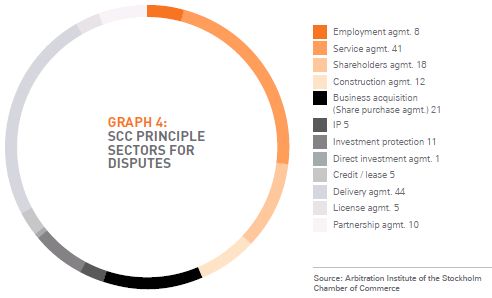
Who are the principle users of these types of disputes and where do they come from? Again, according to the SCC statistics the principal users are from Sweden, Russia, Ukraine, Germany, Norway, UK and Azerbaijan (see Chart 1)
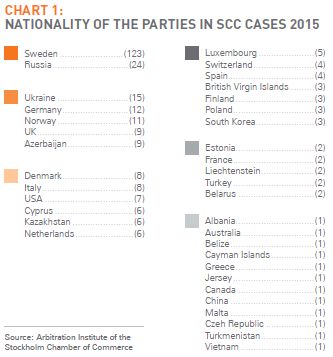
This sort of demographic spread in a historical context may not only explain the rise and success of the SCC for international users but it may also act as a sign post for what may be on the horizon.
During the time of the Soviet Union the SCC was apparently an acceptable dispute resolution forum to Soviet entities that did business with the West. It has been suggested that this may have arisen as a compromise between the communist and capitalist systems - both seeing Sweden as relatively neutral and thus the SCC as acceptable. This could be a historical explanation for why SCC arbitration is often elected by parties from Russia and ex-Soviet satellite countries even today. However, there has been much history since the demise of the Soviet Union and more than a few financial crises since that have forced a re-forging of contractual relationships between international businesses operating in these parts of the world. We also know that there has been an increase in the number of Russian users of LCIA proceedings in London in relatively recent times. On a recent trip to Moscow, one small survey suggested that between 60 – 80% of claimants/potential claimants now elect English law to govern their contracts. Does this mean that during the post-financial crises re-forging of contracts that LCIA dispute provisions are more popular than SCC dispute provisions? It is perhaps too early to tell but something that is worth watching as it continues to shape the size, type and nationalities of SCC disputes.
However, as with most of these types of statistics and surveys, the raw data is only as useful as the minds that assess and understand them. To that end we must turn to the experts. As Stockholm houses some of the best legal minds in Scandinavia it is to the top firms in that fair city that we now turn for insights in understanding what all of this tells us about disputes in Scandinavia now and in the future.
But before we turn to the experts, let's consider for a second what appears to us to be a growing trend in the legal market not only in Sweden but in several jurisdictions – the rise of the boutique law firm. Experienced and talented professionals from top tier law firms setting up on their own. We have not delved nearly as deep into this pool of rising firms in Stockholm but we had the privilege to meet one of them: Norburg & Scherp. Mr Norburg and Mr Scherp are highly experienced with impressive pedigrees. Released from the restrictions of larger firms these power house boutiques have the potential to punch well above their weight. From a claimant or a funders perspective, the rise of the boutique is a positive development and another way to help unlock the time, cost, quality triangle. Their rise should be greeted with the enthusiasm these entrepreneurs exhibit in their practice. Good for them, good for claimants and good for funders too.
WHAT THE EXPERTS SAY
- ANNETTE MAGNUSSON, SECRETARY
GENERAL OF THE ARBITRATION INSTITUTE OF THE STOCKHOLM CHAMBER OF
COMMERCE (SCC) AND GENERAL COUNSEL OF THE STOCKHOLM CHAMBER OF
COMMERCE: BRUNNSGATAN 2, 111 38 STOCKHOLM, SWEDEN
"SCC's popularity stems from the good work done by the SCC and by the arbitrators acting in SCC cases. That work has built trust in the arbitral procedure under the SCC rules. In addition, the popularity shows that the respondents also have trust in Sweden as a jurisdiction." - PROF. DR. KAJ HOBÉR,
ARBITRATOR, THE ARBITRATION INSTITUTE OF THE STOCKHOLM CHAMBER OF
COMMERCE (SCC): BRUNNSGATAN 2, 111 38 STOCKHOLM,
SWEDEN
"Sweden is uniquely placed as a leading international arbitration centre for several reasons: 1) The SCC is one of the most forward thinking arbitral institutes in the world with a focus on time and cost efficiency and experienced and professional arbitrators. 2) Sweden has since the 1970s been the chosen dispute resolution forum for east vs west disputes. Arbitrators from the SCC have a depth of experience in dealing with these disputes unrivalled in any other arbitral institution. 3) Sweden has been and remains one of the most arbitration friendly jurisdictions in the world. The courts have long recognised the independence of the arbitral process and seek to support it as the chosen form of dispute resolution between commercial entities." - RIKARD WIKSTRÖM,
PARTNER, WHITE & CASE: BIBLIOTEKSGATAN 12 BOX 5573,
SE-114 85 STOCKHOLM, SWEDEN
"The arbitration community in Stockholm is active and vibrant with a large pool of competent lawyers who all speak very good English. The courts are arbitration-friendly and competent in arbitration law. Moreover, the SCC is a light-touch, no-nonsense arbitration institute – it acts quickly and is much more unbureaucratic than many other international arbitration institutes. Finally, Stockholm as a city is attractive with a booming restaurant scene and beautiful surroundings." - KRISTOFFER LÖF, PARTNER
AND CO-CHAIR OF THE DISPUTE RESOLUTION PRACTICE GROUP, MANNHEIMER
SWARTLING: ADVOKATBYRÅ AB, NORRLANDSGATAN 21, BOX
1711, 111 87 STOCKHOLM, SWEDEN
" Although other arbitration centres in competing jurisdictions like the LCIA in London will continue to grow and attract more disputes from Russia and other Eastern European countries, the SCC has a wealth of experience and knowledge in dealing with these myriad nationalities. As many of these economies continue to open up and restructure, the scope for disputes inevitably increases and so it is distinctly possible that disputes from these regions may surpass the number of disputes from Scandinavian entities in years to come." - JOHAN SIDKLEV, PARTNER AND
HEAD OF THE DISPUTE RESOLUTION PRACTICE IN SWEDEN,
ROSCHIER: BLASIEHOLMSGATAN 4 A, P.O. BOX 7358, SE-103 90
STOCKHOLM, SWEDEN
"Swedish substantive law is easily accessible and its application seldom offers any surprises to the international businessperson, making non-Swedish lawyers and arbitrators feel at home with the legislation as well. This, together with Stockholm being easily accessible and a vibrant and beautiful city with good hearing facilities is the biggest appeal of Stockholm as an arbitration centre in my view." - JESPER TIBERG, PARTNER,
LINDAHL: MÄSTER SAMUELSGATAN 20, 39 STOCKHOLM,
SWEDEN
" If you come to Stockholm to arbitrate, you will be at a place with a long tradition of handling international disputes, an arbitration friendly environment with an active and competent arbitration community. Since the Swedish legal tradition is a mix of continental civil substantial law but that the procedural law is based on the adversarial system, Swedish lawyers will have an understanding of both systems." - JAMES HOPE, PARTNER AND HEAD
OF LITIGATION AND ARBITRATION IN STOCKHOLM, VINGE:
SMÅLANDSGATAN 20, STOCKHOLM 111 87, SWEDEN
"Stockholm's biggest appeal in these uncertain times is that it lies between the east and the west. Sweden is a civil law jurisdiction with an adversarial tradition, and the SCC's international board works actively to choose the most suitable arbitrators to chair its international cases." - JOHAN STROMBACK, PARTNER,
SETTERWALLS: STUREGATAN 10, 114 36 STOCKHOLM, SWEDEN
"The Swedish tradition when it comes to procedure is well adopted to international disputes, it may be noted – as an example – that the Swedish rules relati ng to taking of evidence and production of documents is very similar to the IBA Rules on the Taking of Evidence. Arbitrations in Sweden are generally efficient both in time and costs and you can often expect that the cost for a Stockholm based arbitration will be significantly lower than an arbitration seated in London or Paris."
Originally published in Funding In Focus, Issue 4, 2017
The content of this article is intended to provide a general guide to the subject matter. Specialist advice should be sought about your specific circumstances.

